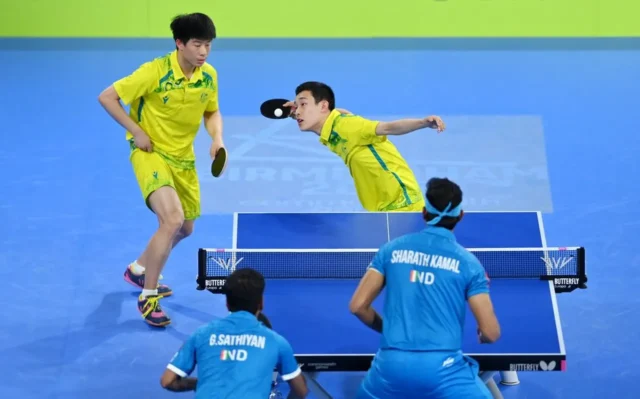
On October 15, 2025 the Commonwealth Sport Executive Board moved to recommend Ahmedabad as the proposed host city for the centenary 2030 Commonwealth Games, a development that all but ended Abuja’s bid and put India on course to stage the Games pending formal ratification by the Commonwealth Sport General Assembly on November 26. The recommendation caps a compressed but intense bidding cycle in which two final proposals — India’s Ahmedabad and Nigeria’s Abuja — were assessed against an urgent checklist of infrastructure, finance, delivery risk and legacy.
The pathway to Ahmedabad’s advantage was straightforward: India presented a plan dominated by existing large-scale venues and rapid infrastructure upgrades rather than a wholly new-build vision, giving Commonwealth evaluators confidence that the centenary edition could be delivered on time and with controlled cost. Key to that case is the Sardar Vallabhbhai Patel Sports Enclave project — a cluster of stadia and arenas that surrounds the Narendra Modi Stadium — together with commitments to expand airport capacity, metro/BRT links and hotel rooms in advance of 2030. Indian authorities framed the bid as part of a long-term sporting legacy that also advances Ahmedabad’s push to host the 2036 Olympics. Those practical, legacy-focused arguments featured heavily in the Executive Board’s recommendation.
Financial credibility and government backing also separated the bids. India’s proposal came with high-level political support and public statements tying the Games to national sporting priorities; that level of state assurance reassured a federation that in recent years has been cautious about approving hosts after a wave of expensive withdrawals. Commonwealth Sport has been explicit about favouring bids that reduce the risk of cancellation or last-minute scaling down — a crucial factor after several previous hosts pulled back for budgetary or logistical reasons. India’s package—mixing upgraded existing venues, pledged public investment and private-sector partners—read as lower risk to the Executive Board than a cost-heavy new-build scenario.
Nigeria’s bid was serious and welcomed by many within the Commonwealth and across Africa, but it ultimately struggled to match the immediacy and scale of India’s guarantees. Abuja’s pitch emphasised regional development, continental representation and the transformational potential of hosting for sport in West Africa. Nigerian officials argued the Games would spur infrastructure and tourism growth, and Abuja was touted as a symbolically important African host. However, in the Executive Board’s assessment cycle, Abuja was seen as carrying greater delivery risk — including questions about timelines for venue construction, transport capacity, and the larger financing package — relative to Ahmedabad’s mix of completed venues and near-term projects.
Operational detail mattered. The presence of the Narendra Modi Stadium — one of the world’s largest cricket arenas that has already staged major global events — and proposed competition clusters in Naranpura, Naroda and GIFT City gave India a ready-made footprint for multiple sports, athlete villages and media operations. The Ahmedabad bid emphajsised athlete experience, transport corridors and broadcast logistics, areas where the Executive Board said the proposal had “thorough assessment” scores. By contrast, Abuja would have faced a heavier programme of new construction and upgrades in compressed timelines, factors that historically attract stricter scrutiny from international federations.
Politics and symbolism also played a part. The 2030 Games are the centenary edition of the Commonwealth Games, and Commonwealth Sport appears to have been swayed by a bid that coupled centenary symbolism with an argument that hosting the Games in a major Asian market would re-energise the event’s global profile and commercial prospects. India made an explicit case that a successful 2030 Games in Ahmedabad could stabilise the event’s financial footing and help rebuild momentum after a run of cancellations and scaled-down programmes. That commercial and reputational calculus resonated alongside technical scoring.
A statement by the Commonwealth Sport said it “assessed candidate cities against a wide range of criteria including technical delivery, athlete experience, infrastructure, governance, and alignment with Commonwealth Sport values”.
However, the Executive Board’s recommendation is not the final legal act. The full membership of Commonwealth Sport will vote at the General Assembly in Glasgow next month to ratify the host. If ratified, Ahmedabad will become the second Indian city to host the Commonwealth Games (after Delhi, 2010) and India will begin a multi-year delivery programme to prepare for the centenary celebration. If the Assembly rejects the recommendation — unlikely but possible in rare political circumstances — the Board’s report would provide the route for further deliberation. Until then, India is the favourite to host, and Abuja’s supporters must regroup to press future bids or push for stronger regional hosting opportunities.
Reactions were predictable. Indian political and sporting leaders hailed the recommendation as vindication of a long-term plan to position Ahmedabad as a global sports hub, while Nigerian officials and commentators expressed frustration that Africa missed the centenary platform. Nigerian media stressed the diplomatic and developmental loss of hosting but also highlighted the seriousness of Abuja’s bid and suggested lessons for any future continental bids: clearer financing guarantees, earlier procurement timetables, and more visible existing venue readiness. Analysts say Nigeria’s experience could still be valuable: strong regional hosting proposals remain important to the Commonwealth’s stated goals of sport development across member nations.
This is the second time Abuja has missed out on hosting the Commonwealth Games, having lost to Glasgow for the 2014 edition. But hopes for future edition lingers as the “Commonwealth Sport Executive Board has agreed to develop a strategy for supporting and accelerating Nigeria’s hosting ambitions for future Games, including consideration for 2034.”
In short, India beat Nigeria for the 2030 Commonwealth Games hosting recommendation because Ahmedabad presented a lower-risk, better-guaranteed package built around substantial existing venues, coordinated infrastructure upgrades and clear government backing — factors that fit a cautious federation seeking a reliable centenary host. The final chapter will be written in Glasgow on 26 November 2025, when Commonwealth Sport’s full membership casts its vote and either formally confers the centenary Games on Ahmedabad or opens the door to further debate.










